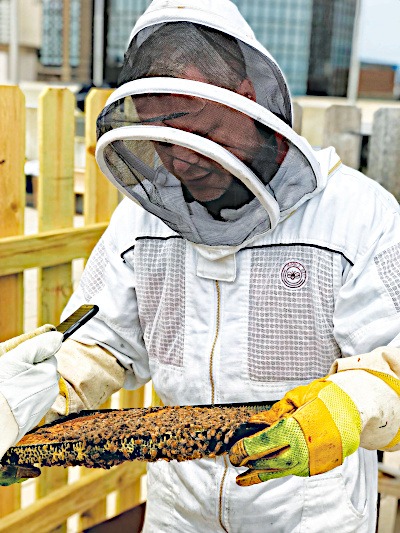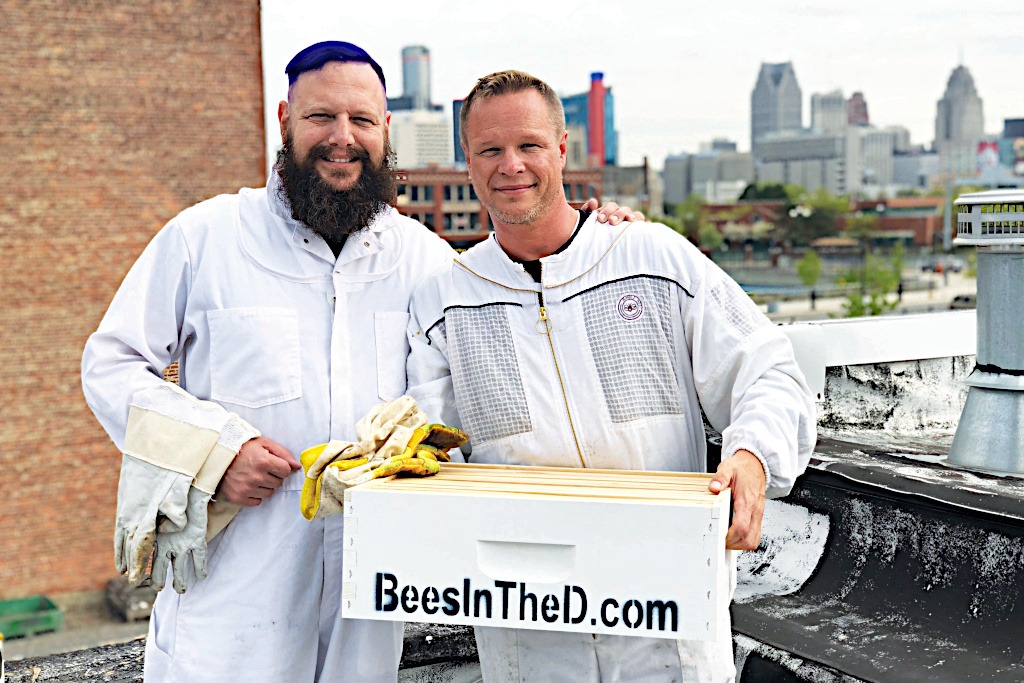Honeybees are magical.
Through their natural instincts, they pollinate our food sources, as well as crops like cotton and hemp. They help flowers grow more flowers. They give us delicious, versatile honey. By just doing their thing, bees’ tiny duties are vital to life itself.
And for Brian Peterson-Roest, honeybees can be very good friends. Peterson-Roest is the founder of Bees in the D (www.beesinthed.com), a non-profit that’s turning the yards and rooftops of Detroit into homespun apiaries. Since 2016, the organization has enlightened the local community about the necessity and benefits of the mighty, simple honeybee. Then he began turning volunteer residents and local workers into beekeepers, setting up beehives and training sessions citywide.
Three years and more than 100 hives and six million new bees later, Bees in the D is generating major Motor City buzz. “We can’t keep up with all of the emails and the phone calls,” says Peterson-Roest. “It’s unbelievable.”
Teaching, Learning, and Beekeeping
The Michigan native is, first and foremost, a devoted fifth-grade science teacher. Peterson-Roest is distinguished in his field, serving as president of Michigan Science Teachers Association and as district science coordinator. Along with several teaching honors, he was personally honored by President Barack Obama with the 2014 Presidential Award for Excellence in Mathematics and Science Teaching.
Peterson-Roest’s first exposure to beekeeping, however, “came because of the generosity of others.” Back in 2009, he was invited as a special educational guest for a two-week course on beekeeping at a biological center on Lake Michigan’s Beaver Island.
“I just fell in love with beekeeping,” he says. “I joke with people that I ‘caught the bug,’ but it was like somebody was looking out for me right when I needed it. [At the time] I was struggling with my identity. I grew up in a home that was extremely conservative, and felt like I was not supposed to be who I was. I was supposed to be what everybody else wanted me to be. I was really wrestling within myself, and the bees were a sanctuary for me. They were an escape, and they got me through some hard times.”
Cut to New York City, where a few years ago Peterson-Roest strolled through busy lower Manhattan. There he noticed group of hives in a small area of Battery Park.
“I didn’t think you could keep bees in a more urban setting,” he says. “I thought people would fight it; that it just wouldn’t work. But I saw the Honeybee Conservancy (www.thehoneybeeconservancy.org) hives right there, and like, millions of people were walking by it—no big deal. And I thought, wait a second, if they can do it, why can’t Detroit?”
Around the same time, he met the man he calls “the most important ‘B’ in my life, my husband”—whose very similar name is Brian Roest-Peterson. Roest-Peterson is an event planner who co-operates Bees in the D. Instantly nicknamed “the Bs,” the couple soon moved to Detroit, where fate intervened.
“When we moved to the city, number one, I missed the bees,” says Peterson- Roest. “Number two, I was reading about all of this colony-collapse disorder [that’s harmed the bee population], and about honeybee diseases and destructive pathogens. And I’m like, wait a second, the bees were there for me, and my hardship. So maybe it’s time for me to step up and be there for them during their hardship.”
That synthesis gave way to Bees in the D. Driven by its mission for education and conservation, the non-profit has several functions, from workshops and fundraising, to community organizing and corporate partnerships.

Honeybee Pollinating a Flower
Swarms of Local Support
At its core, the organization exists to cultivate the honeybee population. Peterson-Roest explains that he works with Detroiters interested in hosting hives that the Bees in the D will manage; or who, once trained, will manage their own beehives. Each hive site is scouted in advance, and could be in a back yard, community garden, residential or commercial rooftop, or virtually anywhere that’s legally allowed.
Along with hobbyist beekeepers, Bees in the D collaborates with many Detroit-based businesses small and large, including sustainability teams of the big-three automakers, Chrysler, Ford, and General Motors. Several more companies and institutions even make the hives essential parts of their own environmental programs, including the Cobo Center’s “living green roof.” Whether through financial support, or materials, talent, and or space donations, Peterson-Roest says it’s encouraging that local companies “care about pollinators in our ecosystem.”
Bees in the D is diligent about training and hive management, so Peterson-Roest is actively involved in overseeing the hives, a duty he relishes despite being a “minimalist” when it comes to the hives.
He explains, “If my hives are fine when I inspect them, and I see signs of a well-producing queen bee and no signs of disease or parasites, I just let them go. They’re nature and they know what they’re doing. Unfortunately, there are a lot of pathogens and diseases that bring down honeybees and colonies, and that’s one reason why their populations are declining. So I may have to do different treatments to the hives, manipulate a hive, or get a healthier queen.”
He adds, “But really my role is just about visiting the hives, which is such a pleasure—because I’m a guest in their house. I consider it my yoga. When I open up a hive it’s this calming nature. I’m telling you, what they have going on in there is just a miracle. It’s unbelievable. And to be part of that is quite a pleasure.”
Where there are bees, there is honey. Peterson-Roest is quick to note that Bees in the D is not in the honey business, so his team has never measured how much honey their hives produce. (Though as both beekeeping and honey harvesting grows in popularity that may soon change.) Rather, he says, “All of the honey we harvest is done for educational purposes.” For him, it amounts to free labor, plus the fun lesson of extracting honey from a hive’s frame.
Even better, local makers are finding delightful ways to use that uber-local honey and wax in their products. You can find lip balm, soap, and lotions made with the wax. Detroit’s boutique confectioner Bon Bon Bon (719 Griswold St. Tel: 313-316-1430. www.bonbonbon.com) flavors its chocolates and other treats with the honey. You’ll find it served in some local restaurants’ food and cocktail menus. And several beverage producers work it into specialty bottles, including Eastern Market Brewing Co. (2515 Riopelle St. Tel: 313-502-5165. www.easternmarket.beer), and Detroit City Distillery (2462 Riopelle St. Tel: 313-338-3760. www.detroitcitydistillery.com).
Meanwhile, fans also enjoy Bees in the D joint events with area partners like Blakes Hard Cidery Co. & Tasting Room (17985 Armada Center Rd, Armada. Tel: 586-784-9463. www.blakeshardcider.com), and B.Nektar Meadery & Taproom (1511 Jarvis St., Ferndale. Tel: 313-744-6323. www.bnektar.com). Those gatherings are among the many year-round tastings and fundraisers for the organization, like the annual summer Bee-Bee-Q. Coming this fall, Peterson-Roest also tells of the upcoming party of the year, the “Beehive Ball” fundraising gala and avant-garde fashion show inspired by honeybees and beekeeping suits. Expect unforgettable beehive hairstyles, some of which may even be edible.

Brian Tending to His Bees
Detroit’s Green Culture
Bees in the D is part of the green wave that’s flooding Detroit with smart environmental solutions. Along with other non-profits like Detroit Dirt (www.detroitdirt.org), a zero waste composting and educational organization, Peterson-Roest thinks his hometown is in a second Renaissance.
“I think the city and its residents are thirsting for anything that’s unique and collaborative, and actually it’s turning into a lot about sustainability, which is really cool,” he says, adding that the city is naturally LGBTQ-friendly too. “Our sustainability programs are setting high bars, they’re so incredible.
And there’s such an entrepreneurial vibe here that I think people are a little bit more involved, and they’re excited to be a part of something. In Detroit, people want to help out and be a part of something that they believe in.”
Even better, the city has a distinct advantage to build sustainably because of what was once a liability: empty lots. Abandoned real estate was long considered detrimental, but today, open spaces are being transformed into urban gardens with diverse foliage—and yes, beehives.
In a tree-filled town like Detroit, green space is abundant. Peterson-Roest calls out Campus Martius Park for its summer “beach” scene and winter ice-skating, plus Capitol Park, Beacon Park, and other pocket parks that form a grassy chain through downtown. They’re complemented by bigger urban oases like Belle Isle Park, which occupies the entire 982-acre island in the Detroit River.
With help from Bees in the D, those parks serve as part of the “Detroit Bee Highway,” a series of safe havens across the greater region where pollinators can stop for food, water, and shelter during their daily high-mileage travels. The highway concept has been a great success thanks to businesses and residences looking to help protect and sustain bees. Between smaller contributions, and greater commitments like hosting a hive and learning how to keep bees, Peterson-Roest is optimistic about the future.
He notes that Bees in the D has grown much faster than expected, and this summer it will add around 50 new hives. Also likely is the creation of a honeybee educational center, the result of donated urban-garden space, a retired shipping container to be converted, and a volunteer architect keen to bring the project to fruition.
“I think people are starting to get it,” he says. “I think people are starting to realize that [honeybee sustainability] is important, and if we don’t do something about it, it’s going to be too late.” Throughout all his pursuits, Peterson-Roest always keeps his sight on serving his beloved bees.
“Beekeeping is of interest to all communities,” he says. “The thing about bees is that they don’t see orientation, they don’t see race, they don’t ethnicity. They just see you as a human, and they are so completely into their hive.”
In a way, Bees in the D operates similarly, with one common pursuit by a diverse board of directors who, Brian proudly notes, consists of people of different ethnicities, ages, and sexual orientations. Assembling a personality mix was a big factor behind launching the company in downtown Detroit, where it can foster inclusiveness and invite different perspectives. Likewise, the Bs are themselves in a symbiotic relationship too, with Roest-Peterson operating mostly behind the scenes. “He sets the stage, I get to shine,” says Peterson-Roest. Such community-building in the human realm, it seems, correlates to the working world of honeybees.
“I know this sounds a little weird, but I honestly believe that the bees know we are there to help them. It’s kind of like if you get a rescue dog—those dogs know that you’re helping them, and that’s all that matters. That’s also why I love working with children, they don’t put people int categories like we do so often as adults. And it’s what I love about Detroit too. It just feels like the whole city is welcoming towards differences. We’ve found nothing but open arms here.”


